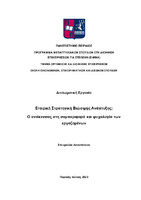Εταιρική στρατηγική βιώσιμης ανάπτυξης : ο αντίκτυπος στη συμπεριφορά και ψυχολογία των εργαζομένων

View/
Keywords
Εταιρική στρατηγική βιώσιμης ανάπτυξης ; Βιώσιμη ανάπτυξη ; Εργασιακή δέσμευση ; Βιωσιμότητα ; Νοηματοδότηση εργασίας ; Corporate sustainability strategy ; Work engagement ; Work meaningfulnessAbstract
Sustainable development, also known as sustainability, is at the forefront of the global agenda as a response to environmental, economic, and social challenges. Today, an increasing number of companies are embracing a corporate sustainability strategy to operate responsibly and ensure their long-term success and viability. Implementing such a strategy can assist companies in generating long-term value for stakeholders, including employees, customers, suppliers, investors, and the broader community. While previous research on corporate sustainability strategy and business interests has primarily focused on the external environmental and societal impacts, there has been a growing interest in recent years regarding the internal social impact it has on employees and the workplace. Studies have demonstrated that adopting a sustainability strategy can result in benefits for employees, such as increased work commitment, job satisfaction, motivation, a sense of purpose, improved health, and well-being. These, in turn, lead to enhanced business performance. Therefore, fostering work engagement and work meaningfulness is vital in today's evolving work environment, where organizations must attract and retain top talent. This study investigates how the implementation of a sustainable development strategy influences employee work engagement and the sense of meaning they derive from their work. To conduct this research, an electronic questionnaire was designed, and responses were collected from 118 employees in a private company that has embraced a sustainable development strategy. The findings reveal that the corporate sustainability strategy can contribute to strengthening work engagement and work meaningfulness, and that these factors interact to predict work engagement.


